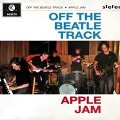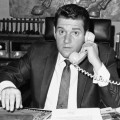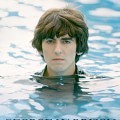- From Faith Current: “The Sacred Ordinary: St. Peter’s Church Hall” - May 1, 2023
- A brief (?) hiatus - April 22, 2023
- Something Happened - March 6, 2023
With Mark Lewisohn lately touting the recording of a business meeting where an album after Abbey Road was being discussed, I was particularly interested in this YouTube edit of interviews with all four Beatles during the same period. (BTW, I’ve heard tell of Lennon’s carve-up plan for decades—four songs for him, four songs for Paul, four for George, and two for Ringo—so I wonder just how unheard Lewisohn’s tape really is. Maybe I’m dreaming, but I’m sure I read this years ago.)
I’ll say right now: there are no bombshells in these interviews (and I seem to remember some of this stuff on the David Wigg album I had as a kid). But I think you will be struck at how open and genial all of them seem towards each other, and the group. Some of this is surely well-practiced PR, but for me, it really underlines how—for all the other tensions that were going on (John’s heroin use, Yoko’s levering him away from Paul, George’s general disinterest in Beatledom, Paul’s creative ascension), the real point of no return was Klein, and the necessity of Paul’s suing the others to keep the Beatles’ catalog out of the clutches of ABKCO.
It is ironic that Allen Klein, who craved nothing more than to be the man behind The Beatles, was so crappy at the personal side of his job that he destroyed the group. Brian Epstein comes in for a lot of knocks in the Beatle canon—and rightly so—but he understood the first rule of managing creative people: keep the talent happy.













So it’s settled – Paul broke up the Beatles 😉
.
Seriously though, the main revelation here is that the publishing industry is so badly run that researchers like Mark Lewisohn have to spend their time giving Abbey Road talks when they should be researching. The tape makes a handy selling point for the talk, and people who don’t know a huge amount about the period will be intrigued enough to go. (In fairness, if Mark’s as engaging a public speaker as his Dylanologist counterpart Michael Gray I’m sure it’s a great night out.)
.
I’ve been struck by the same thing in the 1969 interviews Michael – a fundamental politeness and cheer that make it easier to make sense of George’s ‘flower in a garden’ note. In fact, I think George is politer than I would be at times – imagine writing I Want to Tell You, Within You Without You and While My Guitar only to have a reporter congratulate you years later on finally getting your shit together.
You are correct, Mike. The discussion is documented in Anthony Fawcett’s A Day in the Life of John Lennon. I think the current hoopla focuses on that fact that the significance of the conversation for the breakup was missed for decades.
This is both a happy and a very sad listen. It does all seem very cordial, doesn’t it? Listening to this their future seems so open, bright and full of potential.
.
Who knows how much is just PR. But I personally don’t feel they are putting on a front here: I think they were still good mates (with their incredible artistic synergy intact) – just mates who now had more of their own interests outside of the group.
.
Whatever the status of their relationships at this point, I think the key thing they needed was to get off the 2-albums-every-18-months + movies treadmill that they’d been on for 7 years. To have some more breathing room to adapt the new rock world that had come about in the late 60s. Getting together to record a couple of great singles each year and then an occasional Beatles album when they were ready; more like what many big groups do these days. Maybe even Paul’s proposed low-key, small-venue gigging could have worked and given them a focus outside of recording albums.
.
That all relies on contracts and manager of course. They’d have needed someone who was on their wavelength and largely unselfish. Not a rapacious vulture like Klein. It’s a great collective – and of course personal – tragedy that Brian couldn’t envisage his future role in the Beatles, or lead them towards some new kind of contractual arrangement.
.
We all know how important Epstein was for the Beatles. But I think his importance is still underrated. In particular, he was clearly a key figure for Lennon – a mix of father figure, confidant, and something between friend and lover. He kept John in check to some degree and was probably the only person able to do so. So much of the post-67 story of the Beatles can be explained by/tracked back to the fact that Brian was no longer there.
.
They might have been able to find a new manager of the decent, straight-up kind they needed, but I think it’s basically impossible that this person could have restored the balance in the group that existed thanks to Brian. And that point would make all this theorising about their possible post-Abbey Road future completely moot.